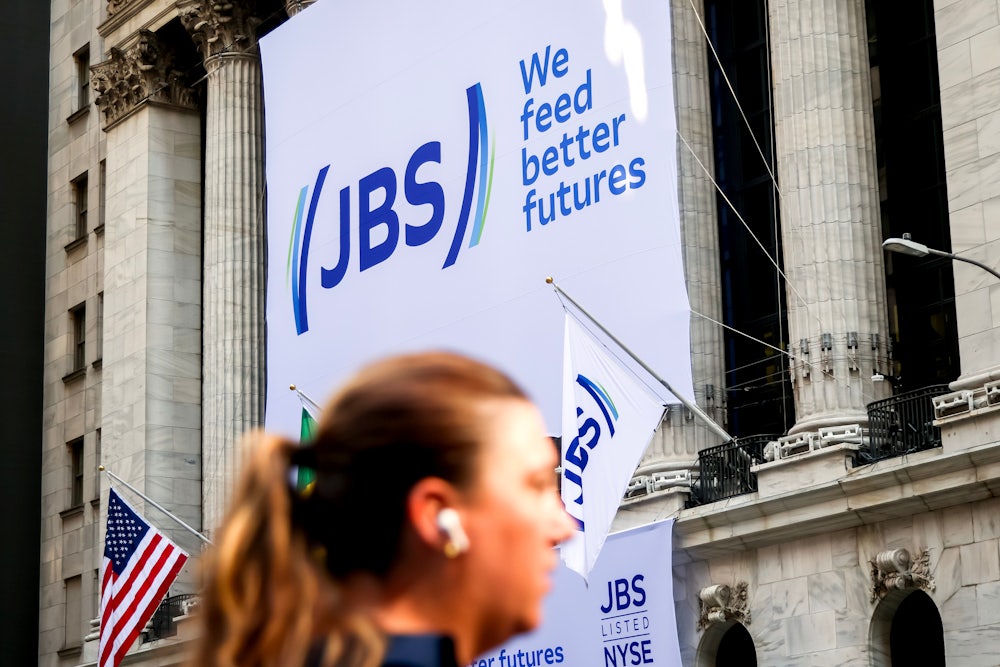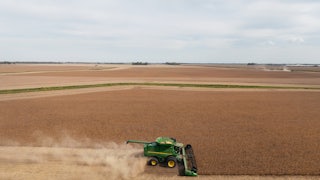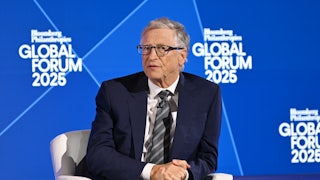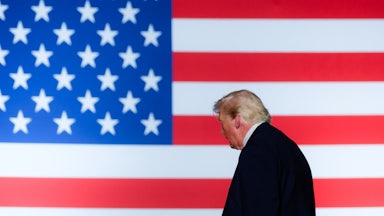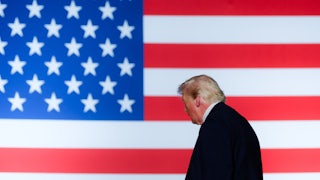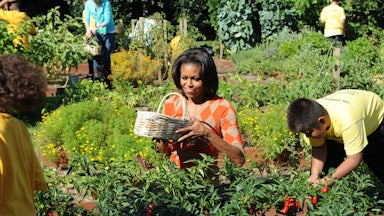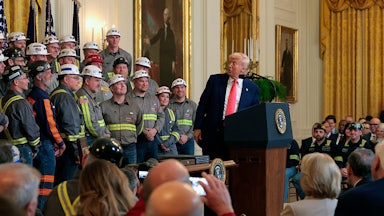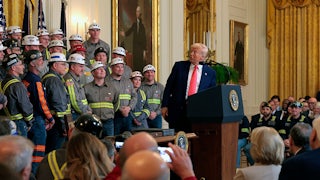“Agriculture can be part of the climate solution,” proclaimed a full-page ad in The New York Times in April 2021, just a few days after Earth Day. “Bacon, chicken wings and steak with net-zero emissions. It’s possible.” This ad by JBS, the world’s biggest meat company and one of its largest agricultural emitters, promised that the company would be net-zero by 2040. The claim would recur in other ads JBS took out in major publications, in its corporate sustainability reports, and in its executives’ speeches to investors. It was the basis for its issuance of over a billion dollars of so-called “sustainability-linked bonds.”
But it’s not clear the company had either a plan or the means to achieve this goal. On Monday, after being sued by the New York Attorney General for false advertising last year, JBS settled for $1.1 million and agreed not to make misleading claims about its climate targets. It’s a small but important victory. But it also shows the lengths to which corporate meat producers will go to deny their complicity in climate change.
As agriculture is increasingly recognized as a major contributor to climate change, agricultural companies have increasingly tried to portray themselves as environmentally friendly. When JBS’s ads first ran, NYU food studies professor Marion Nestle wrote on her blog, “This looks like classic greenwashing”—a term for when companies try to persuade consumers that they are more environmentally friendly than they actually are. Nestle was right to be dubious. JBS’s main product is meat, and particularly beef. Livestock production makes up over half of all food systems emissions and somewhere around 15 percent of all global emissions, with most of that coming from crop production for animal feed and methane emissions from ruminants like cows. In 2021, JBS reported over 71 million tons of carbon dioxide equivalent emissions, a number that had been rising rapidly over the previous half-decade as the company expanded its operations.
It was unclear how these emissions could be zeroed out or even meaningfully reduced. This was the conclusion of the Institute for Agriculture and Trade Policy, or IATP, a food policy think tank that looked into JBS’s claims and found “loopholes, accounting tricks and sleight of hand.” At the heart of these were so-called Scope 1, 2, and 3 emissions, the three categories into which businesses’ emissions are classified. Scope 1 are direct emissions from the company’s facilities. Scope 2 are emissions from the electricity the company buys. Scope 3 consists of all other emissions, including all emissions throughout the value chains for the commodities the company sells.
JBS seemed to be relying on the fact that, as a meat processor, it has relatively limited Scope 1 and 2 emissions; most of its emissions come from land used for pasture, growing crops for animal feed, and the animals themselves, in the form of direct methane emissions and manure. The Food and Agriculture Organization of the United Nations, or FAO, estimates that for livestock companies like JBS, upward of 90 percent of emissions can be Scope 3. But JBS was ignoring Scope 3 almost entirely. In 2020, it had claimed that it wasn’t tracking “enteric and manure emissions from our live animal operation,” or the vast majority of its emissions. This also meant that its self-reported emissions numbers for 2021 were at best estimates. To make matters worse, the company did not seem to have a clear plan to reduce or offset emissions of any scope.
The IATP used this information as the basis for a complaint it made with the BBB National Programs’ National Advertising Division, or NAD, a nonprofit body that allows industries to self-regulate the truthfulness of advertising claims. The NAD found that JBS’s claims couldn’t be verified and in 2023 asked the company to stop making them. But the NAD is not a government body, and its decisions are guidance rather than law. JBS ignored them.
That led to New York Attorney General Letitia James charging the company’s American subsidiary JBS USA with false advertising, claiming that its promises of carbon-neutral meat could “provide environmentally conscious consumers with a ‘license’ to eat beef.” The lawsuit alleged that the company had neither the information nor the means to reach net-zero by 2040. The settlement reached on Monday means that JBS escapes legal culpability but also loses the right to make net-zero promises (according to the full text of the settlement, it can refer to climate targets as “goals” and must provide proof of any actions that actually reduce emissions).
“This is a very small fine. $1.1 million for a multibillion global behemoth is pretty peanuts,” Alex Wijeratna, senior director of investigations and law at Mighty Earth, an environmental NGO, told me. “But it’s pretty symbolic.”
Where there is insufficient binding regulation to check corporate practices, including both emissions and advertising, litigation may help send messages to both the public and policymakers to not trust corporate claims of good climate citizenship. Mighty Earth is currently suing JBS over its climate claims in Washington, D.C., and has long been a dogged opponent of the Brazilian company. It sought for years and ultimately failed to prevent JBS from being listed on the New York Stock Exchange, where its shares began trading in June. Mighty Earth has also filed complaints with the Securities and Exchange Commission regarding JBS’s sustainability-linked bonds, which rely on the same net-zero claims that were the basis for the New York State case. And it has filed a complaint to the Financial Conduct Authority in the U.K. regarding Barclays Bank and its long-standing financing of JBS.
The big problem Wijeratna sees is that the more access to capital the company has, be it through major banks or the NYSE, the more it can fund its “massive expansion plans,” which means more emissions and more deforestation.
JBS has operations around the world, including its ownership of both JBS USA and Pilgrim’s Pride, America’s second-biggest poultry company. Its global expansion has been fueled by political connections and flagrant disregard for the law.
In Brazil, the company was directly involved in the sprawling bribery scandal of over 1,800 politicians that brought down former—and now current—President Inácio Lula da Silva, sending the latter to prison and earning JBS a $3 billion fine. Lula’s convictions were later annulled, and now that he is back in power, the company has welcomed the left-leaning president to launch the expansion of its Brazilian operations. JBS-owned Pilgrim’s Pride was also the largest corporate donor to the Trump inauguration, which Senator Elizabeth Warren suggested may have been intended to help the company’s bid to be listed on the NYSE.
Along the way, JBS and companies owned by it have been fined hundreds of millions of dollars for bribery and price-fixing in the United States and for illegal deforestation of the Amazon in Brazil, in contravention of their own stated corporate policy to not purchase cattle grazed on deforested land. Human Rights Watch has accused the company of buying cattle from illegal cattle ranches linked to deforestation and human rights abuses.
The JBS modus operandi seems to be simply to break laws, pay fines, and keep growing. In this light, the settlement of its false advertising claims with the New York attorney general is just the latest cost of doing business.
With the U.N. Climate Conference COP30 starting in Belem, Brazil, next Monday, where food and agriculture will be up for discussion, climate nongovernmental organizations are warning that Lula’s government and Brazilian agricultural companies like JBS will be looking to greenwash their operations and bolster their climate credentials. At COP30, JBS is not only sponsoring media content related to the summit but allegedly plans to promote research suggesting that its cattle operations in Brazil might actually capture carbon in soil and offset its methane emissions.
The New York state settlement coming right before COP30 should serve as a warning that “agricultural companies will be doing a tremendous amount of greenwashing, talking about carbon capture and regenerative agriculture and all that,” said Peter Lehner, a managing attorney at Earthjustice, an environmental law firm that represented IATP in its complaints about JBS. “I would hope this would make people skeptical about all these claims.”
Whatever the livestock corporations might be saying or selling, consumers and climate watchers would do best to remember that there is no way to check agriculture’s emissions without majorly reducing global meat production and consumption. JBS did not respond to a request for comment for this story.
